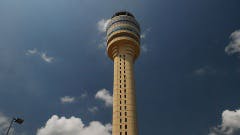Air-traffic controller furloughs ended over the weekend. Snarled operations that caused delays for travelers, especially in the New York City area, are back to normal.
But no one knows for sure what the legislation untangling the situation, passed by Congress and signed by the president, will mean for 149 small airport traffic-control towers slated for reduced hours or closure June 15 because of the federal spending cuts.
Airfields affected by the closures - including Trenton-Mercer Airport, where Frontier Airlines now flies to 10 cities, and the Harrisburg, Latrobe, and Lancaster airports in Pennsylvania - are hopeful the transfer of up to $253 million from an airport-improvement program to prevent reduced operations and staffing through Sept. 30 will keep the small control towers open.
The final legislation, however, does not spell it out precisely, said Mercer County Executive Brian Hughes. The bipartisan effort to halt the furloughs "clearly doesn't mean anything until the FAA spells it out in writing."
"When I look at the press releases coming from members who sponsored the legislation, including U.S. Sen. Susan Collins, there's a very clear intent that the money and extra flexibility to transfer funds was put in the FAA bill to fund contract towers," he said.
Many controllers at small airport towers work for companies with government contracts to provide traffic-control services. They are not Federal Aviation Administration employees, as controllers are at Philadelphia International Airport, according to the agency.
Trenton-Mercer has joined with about 40 airports, led by Spokane, Wash., in suing the government to prevent the tower closures.
General-aviation airports insist they will stay open no matter what, because pilots are trained to land and take off by communicating on a common radio frequency without ground controllers.
"Every time I talk to Frontier, they say, 'If the control tower leaves, we can fly safely using visual rules,' " Hughes said. "Frontier tells us they land in two or three airports now that have no air-traffic control whatsoever."
What concerns people, Hughes added, is that the Northeast United States is heavily traveled, congested air space.
"Frontier has said that on very bad weather nights, they would probably have to try to land somewhere else if we had six feet of snow on our runway," he said. In inclement weather, "you'd really want a controller in the tower to keep pilots up to date on what the field conditions are every minute."
Mercer County is working with its congressional delegation, Hughes said.
"There's a lot of pressure throughout the country," he said. "My belief is the solution is going to include all of us, at least until the end of the fiscal year."
Contact Linda Loyd at 215-854-2831 or [email protected].
Copyright 2013 Philadelphia Newspapers, LLCAll Rights Reserved


